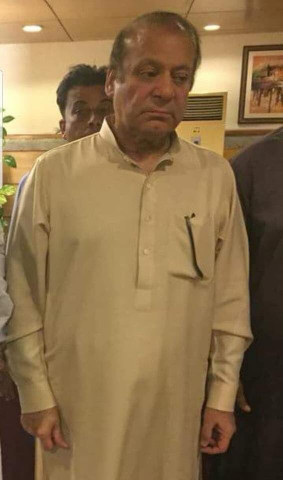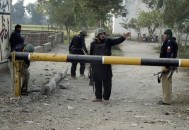Nawaz challenges Supreme Court ruling in judge video case
PML-N supremo contends order is 'without jurisdiction'; seeks withdrawal under Article 188

Nawaz Sharif. PHOTO: PML-N
In August, a three-judge bench headed by Chief Justice of Pakistan Asif Saeed Khosa disposed of a set of identical petitions in the video case and ruled that the clip could only become evidence if its authenticity was established.
The SC also laid down strict standards for the admissibility of video/audio evidence before the court of law.
[Read the judgment here]
In his petition, Nawaz contends that the SC order "is without jurisdiction as it impinges upon the jurisdiction of the learned Appellate Court by pre-judging the issues that may or were/are likely to come before it for adjudication in the appellate jurisdiction under National Accountability Ordinance (NAO) 1999 in due course."
The petition objects to the SC's decision to pass a ruling without providing Nawaz an opportunity of a hearing, stating that it is violative of the constitutional guarantee that all citizens will be treated in accordance with the law.
SC lays down criteria for admissibility of Malik's video
"… passing an order with respect to a matter that specifically relates to the rights or interests of a litigant in pending litigation without providing him an opportunity of a hearing is tantamount to depriving him of his right to the protection of the law," reads the petition.
Among various contentions, another point raised in the petition is that certain directions in the SC order "constitute micromanaging the judicial functions of the Appellate Court".
The PML-N leader has sought the withdrawal of the SC judgement under Article 188 of the Constitution that empowers the top court to review its judgments and orders.
Nawaz has also recently filed a petition requesting the Islamabad High Court (IHC) to make approvers five people related to the judge video case.
In the appeal filed through his counsel, the former premier adopted the stance that the statements of witnesses be recorded as a fair trial in the Al-Azizia Steel Mills reference was his basic right.
The petition stated five people should be made approvers, including the central figure, Nasir Butt, and the British experts who prepared the forensic report of the video and audio.
Nawaz said the statements of the witnesses were necessary for the court to give a free and fair verdict on the main appeal in the Al-Azizia Steel Mills reference.
"A free and fair trial is the basic right of the petitioner,” stated the plea, adding that the judge in question had confessed that he was not innocent while a fair trial could not be expected as the Supreme Court had raised questions over his conduct.
Videogate controversy
The foundation for the case were laid in July when the ex-PM's daughter, Maryam Nawaz, released a video containing an alleged confession by judge Arshad Malik that he was "pressurised" and "blackmailed" to give a decision against Nawaz Sharif.
Consequently, several petitions were filed in the Supreme Court requesting the formation of a probe committee or a judicial commission to investigate the matter.
It is pertinent to note that Malik denied the allegations in a letter to the chief justice of the Islamabad High Court.
In its August order, the SC noted that the relevant video could not be of any legal benefit to Nawaz unless it was properly produced before the IHC in the pending appeal, its genuineness was established and then the same was proved in accordance with the law for it to be treated as evidence in the case.
"There cannot be two opinions about the legal position that it is that court alone which can at present maintain, alter or set aside such conviction and sentence on the basis of the evidence brought on the record," stated the order.
The judgement read that an appellate court could take additional evidence under Section 428 of the CrPC. "Under this section, an appellate court can take additional evidence on its own or upon an application of a party to the appeal, i.e. the appellant, the state or the complainant but in both such cases the appellate court has to record its reasons as to why it thinks that taking of additional evidence is necessary."
It also stated the necessity of taking additional evidence at the appellate stage should be felt by the appellate court itself and the same was not to depend upon what a party to the appeal thought of such necessity.
"After feeling the necessity of taking additional evidence and after recording reasons for such necessity, the appellate court may either take such evidence itself or direct it to be taken by a magistrate or, when the appellate court is a high court, by a court of session or a magistrate.
"Where the additional evidence is taken by the court of session or the magistrate, it or he shall certify such evidence to the appellate court and the appellate court shall then proceed to decide the appeal on the basis of the pre-existing evidence as well as the additional evidence lawfully becoming a part of the record," read the order.
"It goes without saying that in such a case the relevant video may be taken as (additional) evidence only after complying with the requirements for proving a video before a court of law."



















COMMENTS
Comments are moderated and generally will be posted if they are on-topic and not abusive.
For more information, please see our Comments FAQ